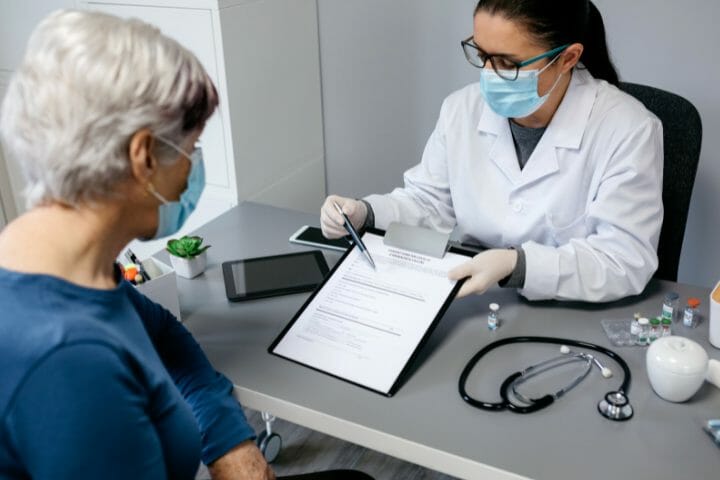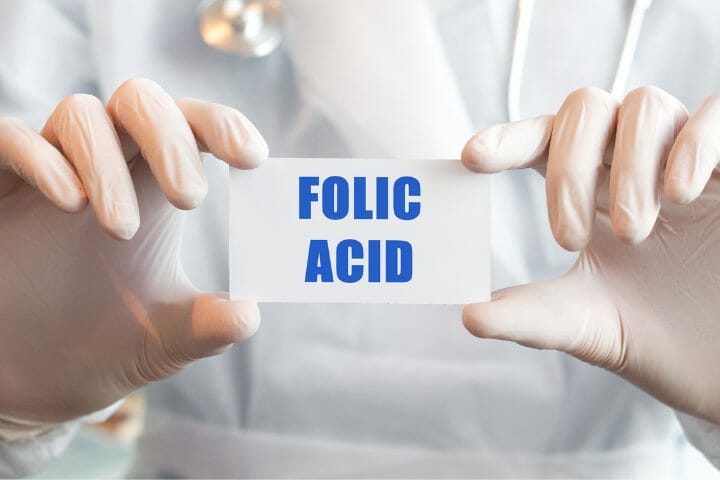Folic Acid is one of the most important nutrients for aging minds. Let us talk about folic acid benefits for the elderly, and what you need to know about its risks as well.
Contents
As we age, our body loses some of its essential nutrients. This can lead to deficiencies that can cause health problems. One such nutrient is folic acid.
Folic acid is critical for elderly adults because it helps keep the brain healthy and reduces the risk of age-related health problems. This blog post will discuss the benefits of folic acid for elderly adults and how to get enough of this vital nutrient.

Benefits Of Folic Acid
#1. Folic Acid Increases Mental Agility In The Elderly
Folic acid is an essential nutrient that plays many vital roles in the body. In addition to supporting cell growth and development, folic acid can also help boost mental agility in the elderly.
Studies have shown that folic acid helps protect against age-related cognitive decline and helps maintain neuronal health. For example, a study published in the journal Neurology found that older adults with high levels of naturally occurring folate in their blood had better verbal fluency than those with lower levels of this nutrient.
#2. Better Memory Slower Mental Decline
One of the most notable benefits of folic acid is its positive effects on memory. Studies have shown that people with lower folate levels in their blood tend to have poorer memory than those with higher levels.
This may be because folic acid is involved in serotonin production, which plays a role in mood regulation and cognition. And because depression has been linked with reduced cognitive abilities, consuming adequate amounts of folic acid may also help prevent mental decline as we age.

#3. Reducing heart disease risk factors
Benefits for heart health, folic acid has also been shown to play an essential role in proper fetal development by helping to prevent congenital disabilities such as spina bifida and neural tube defects. Therefore, it is necessary for pregnant women or those planning to get pregnant to ensure that they get enough folic acid in their diet.
#4. Maintaining brain health
Folic acid is vital for maintaining brain health. It helps to prevent congenital disabilities of the brain and spine and can also help to prevent Alzheimer’s disease and other types of dementia. Taking folic acid supplements may also help to improve memory and cognitive function in people who have already developed these conditions.
#5. Treating mental health conditions
One of the main ways that folic acid can be used to treat mental health conditions is by helping to produce neurotransmitters in the brain. These neurotransmitters are responsible for sending signals between neurons and keeping moods balanced and stable. Low levels of folic acid may lead to impaired production of these neurotransmitters, which can cause symptoms such as low mood or depression.

#6. Folic Acid For Pregnancy
Folic acid is a nutrient found in leafy green vegetables, legumes, nuts, and fortified foods. All women of fertility age should take a daily supplement of 400 micrograms (mcg) of folic acid, even if they don’t plan to get pregnant. Pregnant women need to get enough folic acid because it helps to prevent specific congenital disabilities in the baby’s brain and spine. Good sources of folic acid include:
- Leafy green vegetables such as spinach, broccoli, and kale
- Legumes such as black beans, lentils, and kidney beans
- Nuts such as peanuts and walnuts
- Fortified foods such as breakfast cereals, bread, and pasta
You might like to read: Should Dementia Patients Drink Coffee?
Risks of Excess Folic Acid Use
Autism
Autism is a complex neurological condition resulting in impaired social skills and communication. While the exact reason for autism remains unknown, scientists have identified several possible risk factors for this disorder, including exposure to harmful chemicals or viruses during pregnancy and taking certain medications or vitamins during pregnancy. One such vitamin linked to an increased risk of autism is folic acid.
Cancer
Research suggests that there may be an increased risk of developing certain types of cancer when taking large amounts of folic acid through supplements or fortified foods. Studies have found that people who take more than 1 milligram (mg) per day of folic acid from supplements or fortified food sources are at an increased risk for colorectal cancer and prostate and lung cancer. There is some evidence that high levels of folic acid may
accelerate the growth of lung cancer in people who also smoke.

Impaired immune function
There are many potential risks associated with taking high doses of folic acid, including impaired immune function. One study found that giving mice high amounts of folic acid resulted in the death of some B cells and decreased production of antibodies by those that remained alive. This indicates that folic acid supplementation may impact your immune system by reducing its ability to respond appropriately to bacterial or viral infections.
Foods To Avoid When Taking Folic Acid
Some foods should be avoided when taking folic acid supplements, as they may interfere with absorption. These foods include alcohol, caffeine, and certain types of leafy green vegetables like spinach and kale.
If you are taking folic acid supplements or planning to become pregnant, it is essential to talk to your doctor about which foods might be best for you and how much supplementation you need. By understanding what foods to avoid when taking folic acid, you can help ensure that you are getting the most benefit from this vital nutrient.
Alcohol: Alcohol can interfere with the absorption of folic acid and should be avoided when taking supplements. If you are pregnant or planning to become pregnant, it is essential to avoid alcohol.
Caffeine: Caffeine can also interfere with the absorption of folic acid and should be limited when taking supplements. Pregnant women should limit their caffeine intake to 200mg per day (about 2 cups of coffee).

Leafy green vegetables: Some leafy green vegetables, such as spinach and kale, contain substances that can bind to folic acid and make it less available to the body. This is especially true when these vegetables are eaten raw, and in large amounts, so they should be avoided if you take supplements. However, cooked and lightly steamed leafy greens are still a great source of vitamins and nutrients and can increase folic acid levels in the body.
Fast foods: Fast foods can contain high levels of fat that interfere with the body’s absorption of nutrients such as folic acid. If you eat fast food, choose healthier options such as grilled or baked chicken or fish instead of fried meats.
Processed foods: Many processed foods, such as breakfast cereals, have added folic acid. However, these foods can also contain other nutrients that can compete with or bind to folic acid, making them less available to the body. You should limit your intake of processed foods if you are taking supplements.
Vitamin C supplements: Vitamin C can interact with folic acid and reduce its absorption, so it is best to avoid taking high doses of vitamin C when taking supplements.
Speak to your doctor before changing your diet or supplement regimen. By understanding which foods to avoid when taking folic acid, you can help ensure that you are getting the most benefit from this vital nutrient.
You might like to read: Is Coffee Good For Seniors?
Frequently Asked Questions
#1. What does folic acid do for the elderly?
There are several ways that folic acid can benefit older adults. First, it helps keep the nervous system functioning properly by supporting the creation and repair of neurons.
Second, it supports red blood cell production and may help prevent anemia, common among older adults due to reduced iron absorption or other causes.
Additionally, folic acid may support heart health by maintaining healthy levels of homocysteine – a compound that has been linked with cardiovascular disease when elevated.
#2. Do seniors need folic acid?
Yes, seniors need folic acid for many reasons. Folic acid helps the body produce new cells and prevents changes to DNA that can lead to cancer. It also helps the nervous system function properly and can reduce the risk of heart disease and stroke. Seniors should take 400 micrograms (mcg) of folic acid daily.
#3. How much folic acid should seniors take?
Seniors should take 400 micrograms of folic acid every day to help prevent neural tube defects and other health problems. Folic acid is a type of B vitamin that helps the body produce new cells, including red blood cells.
#4. How much folic acid should a 70-year-old take?
As we age, our bodies become less efficient at absorbing and using nutrients from food. A 70-year-old should take 400 micrograms of folate (the natural form of folic acid) a day. Folic acid is imperative for the production of red blood cells, so taking a supplement can help to prevent anemia.
#5. What happens if you don’t take folic acid every day?
Folic acid is a water-soluble vitamin found in leafy green vegetables, legumes, nuts, and fortified foods. The best way to get the recommended daily amount of folic acid is to take a supplement.
If you don’t take folic acid every day, you may be at risk of developing specific brain and spine congenital disabilities. These congenital disabilities are severe and can even be life-threatening. Be sure to talk to your doctor about how much folic acid you should take based on your individual needs.
#6. Does folic acid raise your blood pressure?
There is some evidence that folic acid may help raise blood pressure in people with Hypertension. A small study found that taking a daily supplement of folic acid was associated with a slight increase in blood pressure. However, the study did not find that folic acid affected blood pressure in people with normal blood pressure.
#7. Who should not take folic acid?
Many people should avoid taking folic acid. Those with a history of seizures or epilepsy, for example, should not take folic acid. If you have a personal or family history of cancer, it’s best to steer clear of folic acid. Pregnant women should be careful about consuming too much folic acid – if consumed in excess during pregnancy, it can cause congenital severe disabilities.
A Few Final Words
Now you understand the importance of folic acid for older adults and how it can help improve their health. We have also shared some of the risks of excessive use of folic acids.
We love hearing from our readers! Talk to your doctor about adding a supplement if you are not getting enough folate in your diet. If you have any other questions, please leave them in the comments below.
